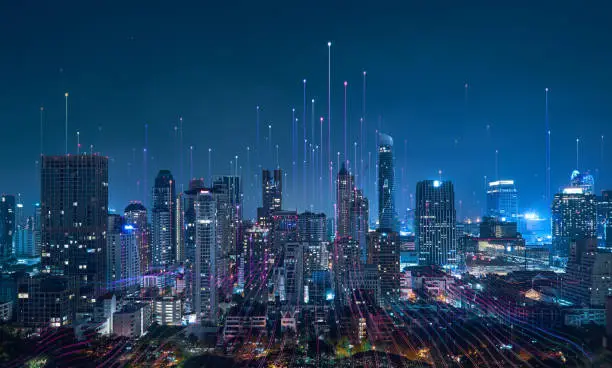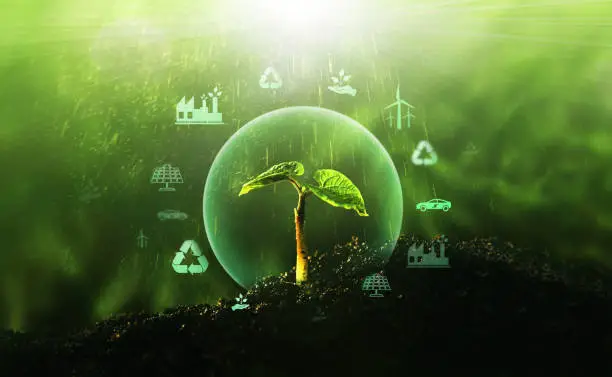.png)
Eco-Friendly Innovations Taking Over in 2024
As the global community grapples with the pressing need to address climate change and promote sustainability, 2024 brings a wave of eco-friendly innovations that are set to revolutionize various industries.
From cutting-edge technologies to innovative approaches in everyday life, these advancements aim to reduce environmental impact and create a more sustainable future for our planet.
In this blog post, we will explore some of the most promising eco-friendly innovations taking center stage in 2024.
Green Energy Solutions
The pursuit of sustainability has intensified, placing renewable energy at the forefront of global efforts in 2024. Notably, this year marks a substantial leap forward in the development and utilization of green energy technologies.
Key players in the industry are focusing on enhancing the efficiency of solar power, wind energy, and hydropower, driving progress towards a more sustainable and eco-friendly energy landscape.
Solar power, a cornerstone of the green energy movement, is experiencing remarkable advancements. Innovations in photovoltaic technology and solar panel design are contributing to increased energy capture and improved overall performance.
The efficiency of solar panels is on the rise, making them more accessible and cost-effective for widespread adoption. Additionally, research and development efforts are focused on enhancing the durability and recyclability of solar components, further aligning the technology with the principles of sustainability.
Wind energy, another pivotal component of the renewable energy mix, is undergoing significant improvements in both turbine design and efficiency. Engineers and scientists are developing larger, more powerful wind turbines that can harness wind energy more effectively, especially in challenging environments. Furthermore, innovations in offshore wind farms are expanding the potential for clean energy generation, reducing the reliance on traditional fossil fuels.
Hydropower, a long-established source of renewable energy, is also evolving with new technologies. Advances in turbine technology and water flow management are optimizing energy extraction from rivers and other water bodies.
Sustainable practices in dam construction and reservoir management are being prioritized to mitigate environmental impacts and ensure the long-term viability of hydropower projects.
One of the critical challenges facing renewable energy adoption has been the intermittency of sources like solar and wind. However, breakthroughs in energy storage systems are revolutionizing the reliability of these green energy sources.
Grid-scale batteries are playing a pivotal role in storing excess energy during peak production periods and releasing it when demand is high. This not only addresses the issue of intermittency but also facilitates a smoother integration of renewable energy into existing power grids.
Advanced energy management systems are complementing the developments in energy storage. These systems enable precise monitoring, control, and optimization of energy distribution, ensuring efficient utilization of renewable resources. Smart grids, equipped with real-time data analytics, are becoming integral to managing the complexities of a decentralized and diverse energy landscape.
As green energy solutions continue to evolve, the dependency on fossil fuels is diminishing. The concerted efforts of researchers, engineers, and policymakers are driving the global energy transition towards a more sustainable future.
With ongoing advancements in technology, coupled with a growing awareness of the environmental impact of conventional energy sources, 2024 represents a pivotal moment in the journey towards a cleaner and greener energy paradigm.
Sustainable Transportation

The landscape of transportation is experiencing a profound shift as the global community embraces sustainable practices, primarily driven by the surge in electric vehicles (EVs) and the proliferation of sustainable mobility solutions.
In 2024, electric cars, buses, and bikes are not just emerging trends; they are becoming increasingly affordable and accessible, paving the way for a substantial departure from conventional fossil fuel-based vehicles.
The adoption of EVs is not only driven by environmental considerations but also by advancements in technology, leading to enhanced performance, longer battery life, and improved charging infrastructure.
Electric vehicles are not the only players in this transformative journey; the transportation sector is witnessing promising developments in hydrogen fuel cell technology and biofuels. Hydrogen-powered vehicles offer an alternative option for clean and efficient transportation, emitting only water vapor as a byproduct.
Meanwhile, biofuels derived from sustainable sources present a renewable and environmentally friendly alternative to traditional gasoline and diesel fuels. These advancements contribute to a diversified and sustainable future for transportation, reducing the overall carbon footprint of the industry.
Circular Economy Initiatives
In 2024, businesses are increasingly recognizing the imperative to adopt circular economy principles, marking a significant paradigm shift towards minimizing waste and maximizing resource efficiency. This comprehensive approach encompasses every stage of a product's lifecycle – from initial design to end-of-life disposal.
Companies are reimagining their production processes to ensure that materials are reused, recycled, or repurposed, moving away from the linear "take, make, dispose" model.
Circular packaging is gaining prominence as companies seek alternatives that minimize environmental impact. Sustainable supply chain practices are being integrated to ensure that raw materials are sourced responsibly, and production processes adhere to eco-friendly standards.
Additionally, innovative waste management solutions are emerging, with an emphasis on reducing landfill waste and maximizing the recovery of valuable materials through recycling and upcycling initiatives.
This shift towards a circular economy is not only environmentally responsible but also economically viable. By rethinking how products are designed, manufactured, and consumed, businesses are not only contributing to the preservation of natural resources but also creating new economic opportunities.
As circular economy initiatives gain momentum in 2024, they are fostering a more regenerative and sustainable economic system that aligns with the global commitment to environmental stewardship and responsible resource management.
Smart Buildings and Cities

The momentum behind smart buildings and cities is palpable as technology takes center stage in optimizing resource usage and elevating environmental performance.
In smart buildings, the integration of cutting-edge technology is revolutionizing traditional approaches to construction and management. Intelligent building systems, equipped with sensors and automation, are orchestrating a harmonious dance of energy efficiency, lighting optimization, and climate control.
These systems leverage real-time data to adapt to changing conditions, ensuring that resources are used with unprecedented precision. The result is a built environment that not only meets the needs of its occupants but also minimizes its ecological footprint, contributing to a sustainable and efficient future.
On a broader scale, the concept of smart cities is reshaping urban landscapes. Data-driven solutions are at the forefront, providing city planners and administrators with invaluable insights to address pressing challenges.
These solutions encompass managing traffic flow to reduce congestion and emissions, optimizing public transportation systems, and implementing energy-efficient infrastructure to reduce the overall carbon footprint.
As smart cities continue to evolve, the integration of technology is fostering a holistic approach to urban sustainability, where innovation and data-driven decision-making pave the way for more resilient and efficient urban environments.
Eco-Friendly Fashion
The fashion industry is undergoing a remarkable transformation, propelled by a growing commitment to sustainability. In 2024, the spotlight is on eco-friendly materials, ethical production practices, and circular fashion concepts, marking a departure from the conventional fast fashion model.
Innovations abound, with lab-grown fabrics and sustainable textiles crafted from agricultural waste emerging as viable alternatives to traditional materials. These advancements not only reduce reliance on environmentally taxing resources but also showcase the potential for creativity and innovation within the industry.
Closed-loop manufacturing processes are a key player in the sustainability revolution within fashion. These processes emphasize recycling and repurposing, ensuring that materials are reused rather than discarded.
This shift towards circular fashion aligns with a more responsible and ethical approach to clothing production, addressing concerns related to waste and environmental degradation. Moreover, conscious consumer choices are gaining prominence, with individuals increasingly opting for brands that align with their values of sustainability and ethical practices.
The rise of second-hand fashion platforms further reinforces the circular economy, extending the lifespan of clothing and reducing the overall environmental impact of the fashion industry.
Agroecology and Sustainable Agriculture

The agricultural landscape is experiencing a transformative shift towards agroecological practices, emphasizing a holistic approach that prioritizes biodiversity, soil health, and a reduced dependence on synthetic inputs.
This evolution reflects a conscious effort to create a more sustainable and resilient food production system. Precision farming technologies are at the forefront, utilizing data-driven insights to optimize crop management, resource utilization, and pest control.
This precision not only enhances efficiency but also minimizes the environmental impact associated with conventional farming practices.
Innovative cultivation methods, such as vertical farming and aquaponics, are gaining traction as they offer solutions to the challenges of limited arable land and water scarcity.
Vertical farming leverages controlled environments and vertical stacking to maximize space utilization, while aquaponics integrates aquaculture and hydroponics, creating a symbiotic system where fish waste fertilizes plants. These techniques not only bolster efficiency but also contribute to sustainable agriculture by reducing the need for large expanses of land and excessive water usage.
Sustainable agriculture practices, rooted in agroecology, strive to achieve food security without compromising the health of ecosystems. By minimizing the use of chemical fertilizers and pesticides, farmers promote soil health and biodiversity.
Crop rotation and agroforestry are embraced to enhance resilience and natural pest control, fostering a harmonious coexistence between agriculture and the environment. The shift towards agroecology reflects a commitment to regenerative practices that ensure the long-term viability of agricultural systems while addressing environmental challenges.
Ocean Cleanup Technologies
The escalating concerns surrounding plastic pollution and its detrimental impact on marine ecosystems have spurred the development of innovative ocean cleanup technologies.
In 2024, a heightened focus on mitigating plastic waste in oceans is driving the deployment of autonomous drones and floating devices designed to collect and remove debris from the water. These technologies leverage artificial intelligence and machine learning to navigate vast ocean expanses, identifying and efficiently retrieving plastic waste.
Simultaneously, researchers are diligently working towards the creation of biodegradable alternatives to traditional plastics. These sustainable materials aim to address the root cause of plastic pollution by breaking down harmlessly in the environment, thereby reducing the long-term impact on marine life.
From seaweed-based packaging to plant-derived polymers, the quest for biodegradable alternatives is a vital step towards a cleaner and healthier ocean ecosystem.
The integration of ocean cleanup technologies and the pursuit of biodegradable materials exemplify a multifaceted approach to tackling the pervasive issue of plastic pollution.
By combining immediate remediation efforts with long-term preventive measures, the global community is striving to preserve the delicate balance of marine ecosystems and ensure the well-being of aquatic life for generations to come.
Conclusion
In 2024, the world is witnessing a transformative wave of eco-friendly innovations that hold the promise of a more sustainable and resilient future. From advancements in clean energy and transportation to circular economy initiatives and smart technologies, these innovations are driving positive change across various sectors.
As individuals, businesses, and governments increasingly recognize the importance of environmental stewardship, these eco-friendly solutions pave the way for a more sustainable and harmonious relationship between humanity and the planet. Embracing these innovations today will undoubtedly contribute to a healthier and greener world for future generations.